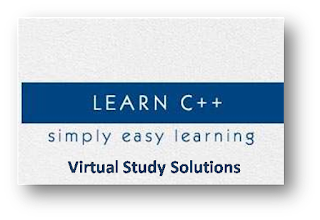Welcome to C++ Programming Language
As You may know C++ is very early programming language but still it has importance in the field of computer science. Here We will Learn basic topic of C++ Programming Language as simple as everyone can understand. |
| C++ Programming Language |
Why Use C++ Programming Language ?
First Question that comes in everyone's mind when they start to learn C++ Programming Language . As We know a Computer/PC is just a processor with some memory, capable of running tiny instructions like “store 3 in memory location 34567.” C++ is a high-level language: when you write a program in it, the short hands are sufficiently expressive that you don’t need to worry about the details of processor instructions.C++ give Programmer access to some lower-level functionality (i.e, memory addresses).
Advantages of Using C++ Programming Language
Lets have a look on advantages of Using C++ Programming Language.
- Conciseness:
- Maintainability:
- Portability:
Lets have a brief look at advantages of Using C++ Programming Language:
- Conciseness: programming languages allow us to express common sequences of commands more concisely. C++ provides some especially powerful short hands.
- Maintainability: modifying code is easier when it entails just a few text edits, instead of rearranging hundreds of processor instructions. C++ is object oriented (more on that in Lectures 7-8), which further improves maintainability.
- Portability: different processors make different instructions available. Programs written as text can be translated into instructions for many different processors; one of C++’s strengths is that it can be used to write programs for nearly any processor.
Important topics of C++ Programming Language:
- Basic programming constructs of C/C++
- Manipulation of data types i.e. arrays, strings, and pointers
- Isolate and fix common errors in C++ programs
- Memory Management including proper allocation/de-allocation procedures
- Object Oriented Approach using C++
- Writing C++ programs
introduction to C++ Programming Language
Here are some Short Notes on C++ Just to Give You an idea of what you are about to Learn. C++ is a programming language--it will allow you to control your computer, making it do what you want it to do. A C++ program is a collection of commands, which tell the computer to do "something".
You can download C++ Lecture Notes from the Links Below:
Introduction of C++
Here You can read an introduction to C++ and hello world program, basic language features and variables.
Introduction - C++ Lecture Notes (111.9 KB)
Introduction - C++ Lecture Notes (111.9 KB)
Flow of control in C++
Here You can read Description of Control structures and Nested Control Structures.
Flow of control - C++ Lecture Notes (127.6 KB)
Flow of control - C++ Lecture Notes (127.6 KB)
Functions in C++
Here You can read Basic use of functions, declaration, arguments, return values and function overloading.
Functions - C++ Lecture Notes (459.7 KB)
Functions - C++ Lecture Notes (459.7 KB)
Arrays and Strings in C++
Here You can read Basic use of arrays and strings.
Arrays and Strings - C++ Lecture Notes (105.5 KB)
Arrays and Strings - C++ Lecture Notes (105.5 KB)
Pointers in C++
Here You can read Pointers and their Behavior, declaration and syntax.
Pointers - C++ Lecture Notes (136.9 KB)
Pointers - C++ Lecture Notes (136.9 KB)
Classes in C++
Here You can read Class declaration, instances, accessing fields, passing as parameters and constructors.
Classes - C++ Lecture Notes (503.4 KB)
Object-Oriented Programming in C++
Here You can read the Basic Ideas of OOP, Encapsulation, Inheritance, Polymorphism and Multiple Inheritance.
Object-Oriented Programming - C++ Lecture Notes (147.0 KB)
Object-Oriented Programming - C++ Lecture Notes (147.0 KB)
Memory Management in C++
Here You can read Memory management, Allocation and De-allocation, new and delete operators.
Memory Management - C++ Lecture Notes (513.5 KB)
Memory Management - C++ Lecture Notes (513.5 KB)
Advanced topics - I in C++
Here You can read Templates, Standard Template Library and Operator Overloading.
Here You can read File handling, References, Exceptions, Pre processor Macros and Casting.
Advanced topics II - C++ Lecture Notes(218.3 KB)
Advanced topics II - C++ Lecture Notes(218.3 KB)
C++ is a core of programming world. Virtual Study Solution's Aim is to explain the every basic topic of C++ as simple as everyone can understand.
Furthermore We will discuss lot of example programs to clear the concept.
How to write C++ program to find Fibonacci Series
How to Write C++ Program to Find Prime Number
How to write C++ Program to find factorial of Number
What is Recursive function in c++ with Examples
C++ program to Make Simple calculator
Find the HCF and LCM by using the C++
Tags: c++, cplusplus, C++ language, Programming in C++, write a c++ program, Introduction of C++, Introduction of C++ Programming Language, C++ Programming Language, VU, Virtual University.
C++ PROGRAMMING EXAMPLE CODES
Write ALLAH Using C++ ProgramHow to write C++ program to find Fibonacci Series
How to Write C++ Program to Find Prime Number
How to write C++ Program to find factorial of Number
What is Recursive function in c++ with Examples
C++ program to Make Simple calculator
Find the HCF and LCM by using the C++
If You have any Query Related to C++. Share with us in Comments.




Post a Comment